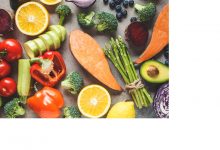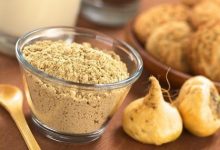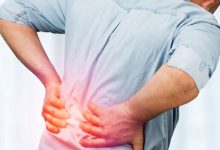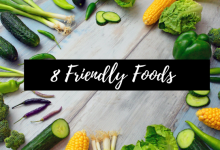Eating Healthy During Your Pregnancy
Good nutrition is extra important during your pregnancy. Not only do you want to feel good yourself, but your body must also provide the right nutrients for the growth of your child. If you already healthy eating during your pregnancy and varied diet, you don’t have to adjust that much. There are a number of nutrients that you can pay extra attention to.
Table of Content
Pregnant and a healthy diet
When you are pregnant, you want to take extra care of yourself and the baby in your tummy. A healthy lifestyle and a varied diet fit in well with this. If you eat according to the Wheel of Five, you and your child will get enough nutrients.
Your baby needs proteins, carbohydrates, fats, vitamins, and minerals to grow healthily and gets them from your diet. By varying with different fruits and vegetables, you can be sure that he is getting all the necessary nutrients. Replacing meat with fish two days a week and a regular vegetarian day with legumes or eggs is also healthy.
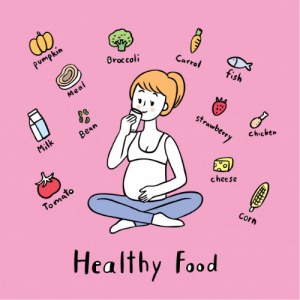
A healthy daily menu
A good starting point for a healthy daily menu can consist of the following:
- 4 or 5 brown / whole wheat sandwiches
- 250 grams of vegetables
- 3 medium potatoes (150 grams), 75 grams of cooked rice, or 150 grams of cooked pasta or legumes
- 2 pieces of fruit
- 2 to 3 servings of dairy: for example 450 ml of dairy products and 30 grams of cheese
- 100-125 grams of (cooked) meat, fish, egg, or meat substitutes
- 40 grams of spreads and cooking fats such as margarine and (olive) oil
- 1.5-2 liters of liquid (including milk)
Eat for two?
An adult woman needs about 2,000 kcal per day and during the last 3 months of her pregnancy, this increases by 300-400 kcal. This means an extra sandwich, a bowl of yogurt, or some more meat, fish, or meat substitute. Your growing baby requires energy, so you have to eat a little more than usual. But eating for two is really not necessary. You want to keep feeling fit.
You also want to avoid a shortage of nutrients during your pregnancy. Strict lines in this period are therefore not recommended. It is not so much the amount of food that you have to adjust, but mainly the quality of your food. If you still want to work on your weight during your pregnancy, read how you can healthily lose weight during pregnancy.
Get pregnant and eat fish
Fish is healthy because of the fatty acids it contains. Especially fatty fish (sardine, salmon, herring, and trout) contain essential building materials for your child’s brain. During your pregnancy, it is recommended to eat fish once a week. Do you not like fish or do you not get to eat fish every week? Then fish oil can offer a good solution. This way you still get the good fatty acids.
However, some fish (tuna, eel, swordfish, zander, mackerel, shark) can also contain dioxins and heavy metals. These are harmful to your child in large quantities. It is, therefore, better to leave these fish alone. Also, don’t eat fish more than twice a week, and avoid vacuum-packed raw and smoked fish. The latter can contain the listeria bacteria.
Also Read: What is the environmental impact of food
Pregnant and vegetarian
If you are a vegetarian, you probably already know how you can get essential nutrients that are also present in meat in other ways. During your pregnancy you can safely eat a vegetarian diet, it is only extra important that you consume enough iron, proteins, and B vitamins.
Don’t give bacteria a chance
Make sure you eat fresh food, wash vegetables and fruit well and cook meat and eggs well. Make sure that your utensils that have been in contact with raw meat do not come into contact with prepared foods and wash your hands before preparing food. This way you limit the chance that potentially harmful bacteria will enter your body. Also, read the article about what you can eat during your pregnancy.
Nutrients to pay extra attention to during your pregnancy
You need more nutrients during pregnancy, such as vitamin D and folic acid. Because you cannot get these from your diet to a sufficient extent, the Health Council advises you to take nutritional supplements for this during pregnancy. Other nutrients, such as calcium, can be obtained well from food.
Folic Acid
Folic acid, or vitamin B11, is normally obtained from green vegetables, whole grain products, meat, and dairy. During your pregnancy, you have a higher need for folic acid, which you cannot get enough of from your diet. A folate deficiency in the early weeks of pregnancy can hinder the development of your baby’s neural tube. This can cause neural tube defects, such as an open spine (spina bifida).
You can take extra folic acid by taking a pill with 400 micrograms daily. Because your baby needs extra folic acid at a very early stage of pregnancy, it is best to start taking folic acid when you are trying to conceive. Keep taking the supplements until you are 10 weeks pregnant. Long-term intake of these amounts, for example, because you have been trying to conceive for some time, has no negative effect on your health.
Vitamin D
In addition to folic acid, you can also use some extra vitamin D. Vitamin D ensures strong bones for yourself and a good bone structure for your baby. Normally you get vitamin D from sunlight and especially from fatty fish. During your pregnancy, taking 10 micrograms of extra vitamin D is recommended.
Calcium
Calcium is necessary for the development of teeth and bones. You get it from milk or dairy products. You’re fine with two to three slices of cheese a day and two to three glasses of milk a day. You can also replace this with other milk products such as yogurt or custard. It is usually better to use the low-fat dairy varieties, which contain less or even no saturated fat, and relatively more protein.
If you have an increased risk of preeclampsia, you may need to take extra calcium during your pregnancy. Discuss it with your midwife before taking extra calcium.
Iron
By consuming enough iron, you reduce the risk of anemia. Iron is found in meat and wholemeal bread, for example. The absorption of iron is promoted by vitamin C, so eat enough fruit and vegetables.
Other vitamins during your pregnancy
In addition to vitamins B11 and D, you do not need vitamin supplements when following a normal diet. If you still want to take this, choose a multivitamin especially for pregnant women. The general multivitamin can contain vitamin A and this can actually be harmful to your unborn baby. Make sure it contains the correct dose of folic acid (400 mcg) and vitamin D (10 mcg).
Also Read: Top Hospitals In India

